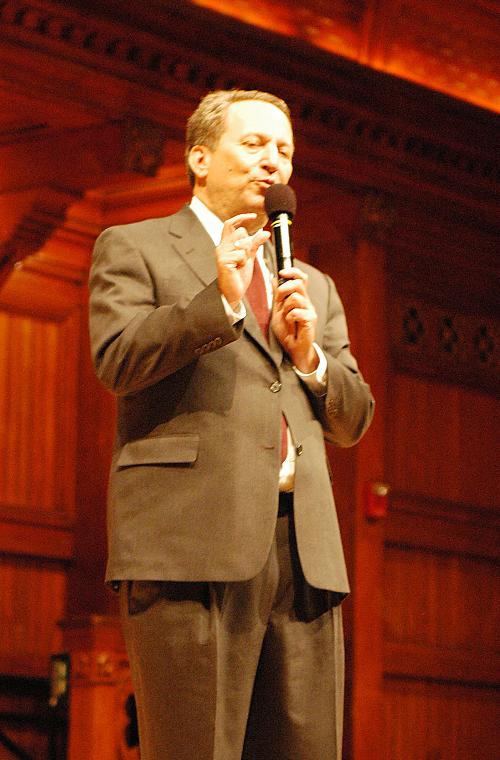
News
Summers Will Not Finish Semester of Teaching as Harvard Investigates Epstein Ties

News
Harvard College Students Report Favoring Divestment from Israel in HUA Survey

News
‘He Should Resign’: Harvard Undergrads Take Hard Line Against Summers Over Epstein Scandal

News
Harvard To Launch New Investigation Into Epstein’s Ties to Summers, Other University Affiliates

News
Harvard Students To Vote on Divestment From Israel in Inaugural HUA Election Survey
Parents Support Summers

A full house of parents offered University President Lawrence H. Summers a pair of standing ovations in Sanders Theatre this weekend, one year after the president attracted a far frostier reception.
Last year’s speech to Harvard parents visiting Cambridge for Junior Parents Weekend was marked by an unusually contentious question-and-answer session focused almost entirely on Summers’ January 2005 remarks on women in science.
But on Friday, a visibly supportive audience greeted the president with warm applause and posed friendly questions following his speech.
One father, positing that the president’s Feb. 21 resignation was at odds with the University’s commitment to valuing ideas, asked Summers, “What the hell happened?”
“You know, it’s a long and complicated story that I expect that I’m not in the position to objectively assess at this point,” Summers responded.
Summers cited tension with the Faculty of Arts and Sciences, which he called “such a central faculty” at the University, as his reason for resigning. But the president said he felt he had a good rapport with undergraduates and productive working relationships with faculty in the professional schools during his tenure.
And the president said he had sensed “great support” for his goals among Harvard alumni, though he conceded that his perception might have been inaccurate.
Summers hesitated when one mother sought his advice to his successor.
“This is like one occasion after another to put my foot in it,” Summers said, drawing laughter. “These are open invitations to confirm stereotypes.”
But he went on to outline some of the objectives he has pursued during his five years at the helm, including boosting financial aid and focusing on the life sciences.
“These are some of the things I hope my successor will care about,” Summers said.
Summers suggested that the set of courses that faculty members individually want to teach is not necessarily the best selection of courses for students—a remark that drew impromptu applause.
Asked by one dad whether faculty tenure is an impediment to promoting excellence in undergraduate education, Summers expressed concern with the increasing age of Harvard’s professoriat due to tenure and federal laws that ban mandatory retirement. But Summers said he sees faculty tenure as important not only because it protects academic freedom, but because without tenure, he said, faculty members would be reluctant to hire new professors that are smarter than themselves.
“I thought he did as well as he could under the circumstances of what’s going on,” said parent Rhonda Dern from Evergreen, Colo., who was in the audience. “I was worried at how it was going to go and I felt that all the questions were supportive.”
In one of last year’s more heated exchanges, parents used the floor to critique Summers’ tenure.
“You should know that there are a large number of parents who are glad that you are here to bring a degree of non-emotional common sense to the University,” one father said last year.
“And there are a lot who think you’re a jerk,” interjected another.
—Staff writer Nicholas M. Ciarelli can be reached at ciarelli@fas.harvard.edu.
Want to keep up with breaking news? Subscribe to our email newsletter.
